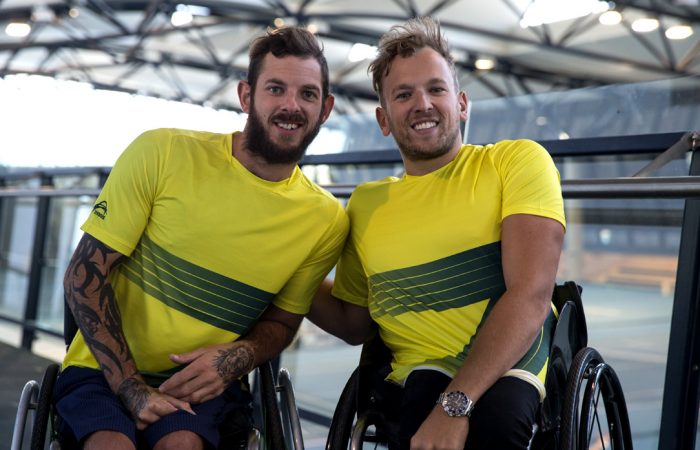Golden duo reflect on Rio fairytale
Having returned to Australia after an inspiring Rio Paralympic campaign, quads doubles gold medallists Dylan Alcott and Heath Davidson reflected on their stunning victory.
Melbourne VIC, Australia, 7 October 2016 | Matt Trollope

The dust has settled. The comedown is complete. Yet, still, Dylan Alcott and Heath Davidson discuss their 2016 Paralympic exploits in a manner of disbelief.
Back from Brazil just over a week earlier, the Aussie duo – who captured the nation’s hearts with their stunning recovery to win gold in the quads doubles final in Rio – sat down with tennis.com.au to discuss their inspirational victory.
Down 6-2, 4-1, 30-0, Alcott and Davidson fought back to defeat Americans David Wagner and Nick Taylor – a pair who were undefeated in Paralympic competition with three gold medals – in a three-set thriller lasting almost three hours.
“I think that’s the only comeback I’ve been involved in in my career,” Davidson laughed. “It was huge. Second set, 4-1, we were ready to go to the bar.”
Interjected Alcott: “I thought we were cooked.”
Davidson added that once they reeled off five straight games to take the second set, his confidence soared. “Honestly at no stage in that third set did I think we were going to lose that match, even though the scoreline was 3-0 (against us in the third),” he said.
“We just stuck to what we needed to do and had fun … I thought we looked pretty calm, watching back on the TV.”
Alcott’s story is by now a rather famous one. Once a promising wheelchair tennis player, the Melburnian switched to basketball, won Paralympic gold in Beijing 2008 and silver at London 2012, before returning to tennis in 2014 and becoming the quad world No.1 a year later.
Yet Davidson went on a tennis hiatus of his own – and it lasted a decade. He played his last competitive wheelchair tennis match in 2005 before making a comeback in 2015.
What had he been doing in the 10 years in between?
“Not much,” he admitted. “I wanted to be a kid, be a teenager, went out with my mates, all that sort of stuff. And then sort of just got stuck in a rut. Struggled with the whole (process of) getting a job and thinking this wheelchair’s gonna ruin me. Found myself in a bit of a dark place.
“But a few things happened in my life and I met a lovely lady who may have had something to do with me picking up a tennis racquet again … We were watching Wimbledon one night and she said: you used to play tennis. And she asked: do you miss it? And I did … but I did nothing about it.
“She really did convince me to pick up the phone and ring my first ever tennis coach, who was mine and Dylan’s coach back when we were (aged) 10 and 14. I went down for a hit the next week, and enjoyed myself – and now I’m doing it because I love it.”
Alcott and Davidson as children played their first tournament together in Albury. Not long after Davidson made his comeback, the duo reunited for a doubles tournament in Johannesburg.
They lost heavily in the final to David Wagner and Lucas Sithole, two of the best players in the world.
“It was like Heath had never hit a tennis ball in his life,” Alcott humorously recounted. “If you’d told me that day in South Africa that we were gonna win gold (at the Paralympics), I would have said ‘good one’. Because it was ugly. That last six months, Heath got so good.”
A day after their doubles victory in Rio, Alcott returned to the court to win singles gold, a goal which he had been open about chasing and which had consumed his focus for much of the last four years.
He said the emotions he experienced in achieving his two Paralympic victories were extremely different.
“The doubles was more enjoyable,” he said.
“You ask any professional athlete – Lleyton Hewitt, Roger Federer, Tiger Woods – and any of them say it’s a feeling of relief when you’re supposed to win (Alcott was the favourite for singles gold) and you win. You think about what it’s like to lose way more than what it’s like to win. You think about how this opportunity only comes by once every four years, and if I lose that match I’m gonna be absolutely shattered.
“I’ve had that feeling, when we lost (in the basketball gold medal match) in London. I didn’t win a silver medal – I lost a gold medal. I was devastated – I can’t tell you how upset we were. And I didn’t want that feeling again.
“So just to have that relief of achieving your dreams and not having to think about what it’s like to lose, and seeing the guy you beat in tears, because now he’s gotta wait four years – that’s what I felt after the singles.
“(On the other hand) the sheer enjoyable of the doubles, especially because I thought we were gonna win before the match, and then we played so bad and were gonna lose, and to then still win the doubles after coming back … you could not write a better script.”